

Mary Sue Test. Background A Mary Sue is an unrealistic type of literary character commonly created by inexperienced authors.
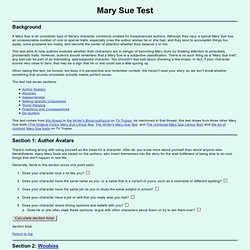
Although they vary, a typical Mary Sue has an unreasonable number of cool or special traits, especially ones the author wishes he or she had, and they tend to accomplish things too easily, solve problems too neatly, and become the center of attention whether they deserve it or not. This test aims to help authors evaluate whether their characters are in danger of becoming Mary Sues by drawing attention to potentially problematic traits.
However, authors should remember that a Mary Sue is a subjective classification. There is no such thing as a "Mary Sue trait"; any trait can be part of an interesting, well-balanced character. When taking this test, be honest, but keep it in perspective and remember context. The test has seven sections: This test comes from this thread in the Writer's Block subforum on TV Tropes. Section 1: Author Avatars. Basic Tips To Write Better (And More Likeable) Badasses. Yet another character type that is often poorly-written by amateurs, many badass characters end up becoming completely unlikeable or even despicable.
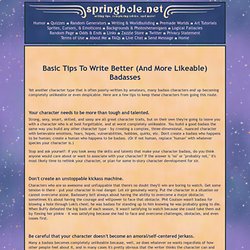
Here are a few tips to keep these characters from going this route. Your character needs to be more than tough and talented. Strong, sexy, smart, skilled, and sassy are all great character traits, but on their own they're going to leave you with a character who is at best forgettable, and at worst completely unlikeable. You build a good badass the same way you build any other character type - by creating a complex, three-dimensional, nuanced character with believable emotions, fears, hopes, vulnerabilities, hobbies, quirks, etc. Basic Tips To Create Better Characters With Tragic & Traumatic Backstories. First, ask yourself why you're giving your character a tragic or traumatic backstory.
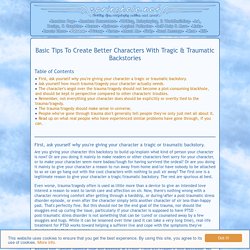
Are you giving your character this backstory to build up/explain what kind of person your character is now? Or are you doing it mainly to make readers or other characters feel sorry for your character, or to make your character seem more badass/tough for having survived the ordeal? Or are you doing it mainly to give your character a reason to run away from home and/or have nobody to be attached to so xe can go hang out with the cool characters with nothing to pull xir away? The first one is a legitimate reason to give your character a tragic/traumatic backstory.
The rest are spurious at best. Even worse, trauma/tragedy often is used as little more than a device to give an intended love interest a reason to want to lavish care and affection on xir. Benjamin Linus from Lost is a good example of a tragic/traumatic backstory used to good effect. The trauma/tragedy should make sense in-universe.
Common, Yet Terrible Character Descriptors - And How To Fix Them. When asked to describe their characters, many people tend to use the same over-generalized descriptors over and over.
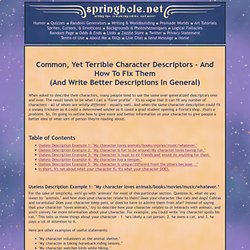
The result tends to be what I call a "Forer profile" - it's so vague that it can fit any number of characters - all of whom are wildly different - equally well. So You Wanna Write/Play A Powerful/Talented Character That Probably Won't Be Perceived As A Mary Sue? Many, many, many times I've seen people complain that they can't write or play powerful characters without these characters being labelled as Mary Sues.
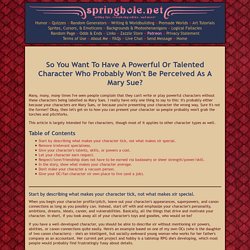
I really have only one thing to say to this: it's probably either because your characters are Mary Sues, or because you're presenting your character the wrong way. Sure it's not the former? Okay, then let's get on to how you can present your character so people probably won't grab the torches and pitchforks. This article is largely intended for fan characters, though most of it applies to other character types as well. Start by describing what makes your character tick, not what makes xir special. The Universal Mary Sue Litmus Test.
Stuck with a case of massive writer's block?

Has your muse gone on indefinite hiatus? The Fantasy Cliche Meter: The Bad Guys. Introducing Characters - First Impressions. Introducing Characters - First Impressions by Melanie Anne Phillipscreator StoryWeaver, co-creator Dramatica When your reader/audience first meets your characters in a story, it has the same effects as when you are introduced to someone in real life.
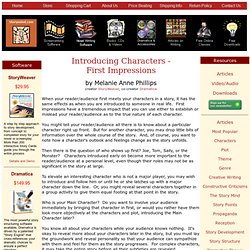
First impressions have a tremendous impact that you can use either to establish or mislead your reader/audience as to the true nature of each character. You might tell your reader/audience all there is to know about a particular character right up front. But for another character, you may drop little bits of information over the whole course of the story. Then there is the question of who shows up first? How Male and Female Characters Think. Creative Writing Course. In this fifth session in my free creative writing course, we will be looking at writing characters.
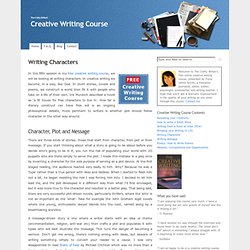
In creative writing we become, in a way, like God. In short stories, novels and poems, we construct a world then fill it with people who take on a life of their own. How to Write Characters. Try Dramatica & StoryWeaver Risk Free* *Try either or both for 90 days.
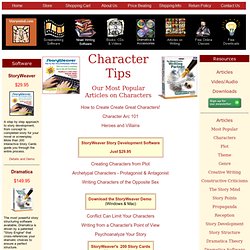
Not working for you? Return for a full refund of your purchase price! About Dramatica and StoryWeaver Hi, I'm Melanie Anne Phillips, creator of StoryWeaver, co-creator of Dramatica and owner of Storymind.com. What They Do. How Not To Write Female Characters. There are already a lot of articles around on how to write female characters.
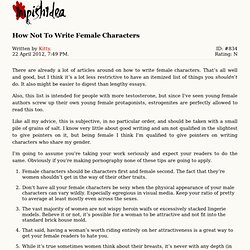
That’s all well and good, but I think it’s a lot less restrictive to have an itemized list of things you shouldn’t do. It also might be easier to digest than lengthy essays. Also, this list is intended for people with more testosterone, but since I’ve seen young female authors screw up their own young female protagonists, estrogenites are perfectly allowed to read this too. Like all my advice, this is subjective, in no particular order, and should be taken with a small pile of grains of salt. I know very little about good writing and am not qualified in the slightest to give pointers on it, but being female I think I’m qualified to give pointers on writing characters who share my gender. I’m going to assume you’re taking your work seriously and expect your readers to do the same.
Character Profiles. Fiction Writing Tips - How to Write Fiction. Below, you'll find some fiction writing tips to help you create characters that come alive. At the bottom of the page, you'll also find more creative writing resources, including our free online writing courses. Are you losing your mind when a fictional character starts to seem real to you? A friend of mine was heartbroken when X died in Harry Potter 6 (we'll call him X to keep from spoiling the book if you haven't read it yet). One of my other friends has a serious crush on Edward Cullin, the sexy vampire hero of Stephenie Meyer's popular Twilight series. The second friend recently showed up for a coffee date with dark circles under her eyes. Advertisement: Guide for Writers: Characters. Most stories are remembered for their characters, not specific plot points. If you want to write a memorable story, create memorable characters.
They do not need to be believable — they need to be dramatic. It Takes Two Often, the best stories are deceptively simple: there are two main characters for the reader to follow. Names for Villains: 5 Tips to Help You Choose a Name for the Baddie. When creating villains, it's all too tempting to give them a name that embodies their evilness. It's important, however, to keep in mind the normal conventions of naming. Names tend to reveal something about location, year, ethnicity, or nationality-not whether a person is destined to be a tyrannical overlord.
Always think about the villain's parents. Would they really name their kid "Diablo? " Other - How to Create Realistic and Believable Characters. How to Create Realistic and Believable Characters 1. Before you think of your character, you need to think of your character's purpose. Is their purpose to hinder your character?
Help him? Is he the main character? 2. 3. 4. Quick Tips: Character Development: Creative Writing. Print version Characters are the most important component of any narrative. Without them, there would be no story. Character development is an important skill to master because characters are important parts of any creative writing from books and short stories, from biographies and autobiographies, to poetry. The development of a character is a very detailed process, and one that requires a lot of thought. According to Candace Schaefer and Rick Diamond (The Creative Writer. 25 Things You Should Know About Character.
Previous iterations of the “25 Things” series: 25 Things Every Writer Should Know. Archetype: The Fiction Writer's Guide to Psychology.